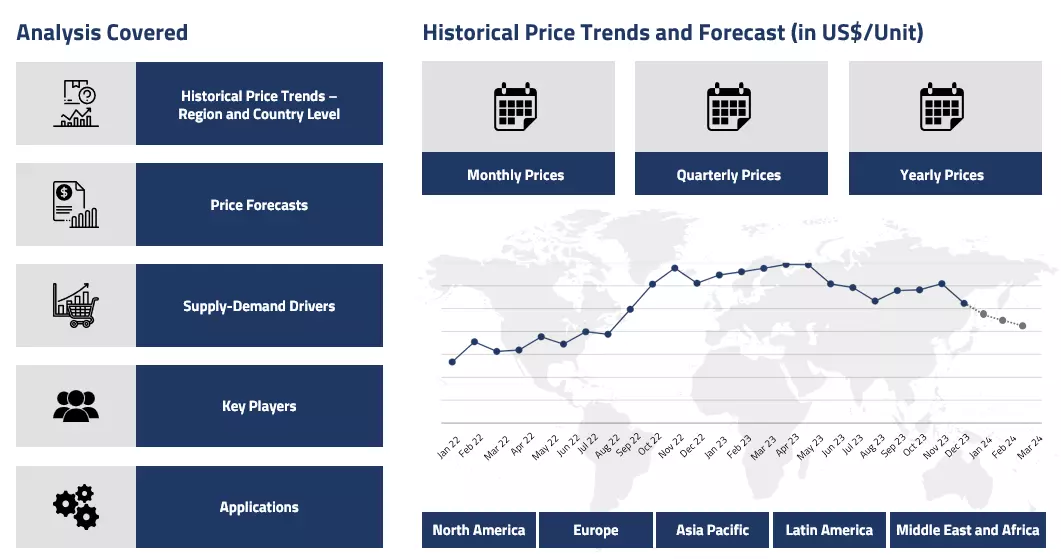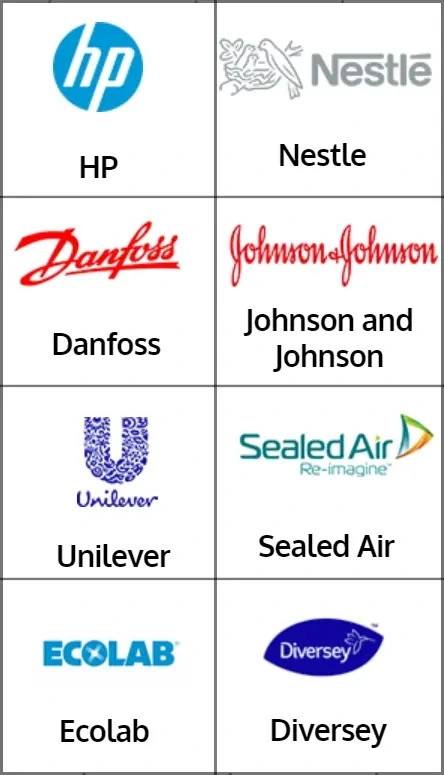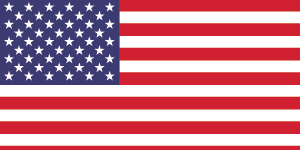Product
Cellulose Price Trend and Forecast
Cellulose Price Trend and Forecast
Cellulose Regional Price Overview
Get the latest insights on price movement and trend analysis of Cellulose in different regions across the world (Asia, Europe, North America, Latin America, and the Middle East & Africa).
Cellulose Price Trend for the Second Half of 2024
The price trend for cellulose in the second half of 2024 exhibited fluctuations, generally remaining on the higher side of the price curve. This was primarily driven by the rising costs of its key feedstock, wood pulp. Wood pulp prices increased significantly due to prolonged supply chain disruptions and reduced availability, which raised production costs for cellulose manufacturers and led to higher prices. The pulp market was notably affected by supply shortages, labor challenges, and growing demand for paper products, particularly from the packaging industry. These pressures compelled many producers to adjust cellulose prices upward to offset escalating raw material costs.
Cellulose Price Chart

Please Login or Subscribe to Access the Cellulose Price Chart Data
Furthermore, rising shipping costs and logistical difficulties, particularly in major pulp-producing regions, added to the financial strain on cellulose producers. Consequently, industries relying on cellulose-based products, including textiles, pharmaceuticals, and food processing, encountered increased prices during this period. While price increases were widespread, their extent varied depending on product grade and contract terms. The market is expected to remain constrained, with fluctuations in feedstock availability and freight costs continuing to influence the upward price trends for cellulose.
Analyst Insight
According to Procurement Resource, manufacturers will likely pass on these increased costs to consumers, maintaining a positive outlook until supply and demand conditions stabilize.
Cellulose Price Trend for the Q2 of 2024
Cellulose is industrially produced primarily through the extraction of plant fibers, with wood pulp being the most common source. The process begins by treating the raw plant material, such as wood or cotton, with chemicals to separate the cellulose fibers from lignin, hemicellulose, and other non-cellulosic materials. Applications in various industries like paper manufacturing, textiles, pharmaceuticals, and food products drove the market sentiments. In the first half of 2024, the imported wood pulp market experienced an initial rise, followed by a decline driven by supply disruptions because of strikes and wars in multiple regions, which tightened supply expectations and raised prices.
Despite rising pulp costs, downstream paper mills struggled with low profitability, limiting demand and procurement enthusiasm, particularly after a sluggish post-Spring Festival period. Although there was a brief boost in cellulose demand in March due to peak production in the raw paper industry, this waned by April, further pressuring cellulose prices. Imports also dropped due to international supply challenges and low downstream acceptance of high prices. Therefore, the cellulose market sentiments were relatively dull in the second quarter of 2024.
Analyst Insight
According to Procurement Resource, supply is expected to outpace demand, which can lead to a continued weakening of Cellulose prices in the short term.
Cellulose Price Trend for the Q1 of 2024
Cellulose is a polysaccharide that is primarily found in plant cell walls. Because of its presence in almost all plant cells, cellulose is also the most abundant organic compound on earth. In Asia, cellulose prices were intricately linked to the international agriculture market throughout the first quarter of 2024.
Chinese cellulose prices initially dipped but stabilized around March, influenced by the sliding curve of vegetable prices in Asian markets. Conversely, the European cellulose market saw a swift incline in prices due to reduced grain supply from Ukraine, a top exporter in the region.
The ongoing war with Russia led to a notable decline in plantation areas, causing supply volumes to shrink and prices to rise. Furthermore, the European agriculture market's strong performance at the end of the previous year provided a price advantage in the first quarter of 2024.
Meanwhile, in North America, cellulose market dynamics paralleled those of Asia, with the United States experiencing increased corn acreage but weak demand from downstream industries. Market sentiments remained diverse across regions. These variations underscored the complex interplay between supply, demand, and geopolitical factors shaping cellulose prices worldwide.
Analyst Insight
According to Procurement Resource, given the fluctuations in the supply and demand outlooks of Cellulose across different regions, the price trends are likely to waver in the coming months as well.
Cellulose Price Trend for the First Half of 2023
The price trend for Cellulose continued on the same downward-wavering trajectory in H1’23. The market experienced some normalization in the first half of 2023. The upstream cost support declined substantially because of gradually stabilizing crude oil prices since the Russian Oil supplies were still free-flowing for some major economies like India and China.
Further, new supply chains and trade routes came into existence as trade normalization practices were being employed to battle the mounting global economic inflation. Overall, the cellulose prices swung low during the said period with some occasional reverse fluctuations, especially in the latter half of the second quarter, as the inventories were gradually moving.
Analyst Insight
According to Procurement Resource, the cellulose prices project some increase in the upcoming months, but narrow-ranged fluctuations are expected.
Cellulose Price Trend for the Q2, Q3 and Q4 of 2022
Cellulose being the major component in plant cell wall composition is often sourced out of plant pulps like that of cotton, wood, and hemp. It is the most abundant natural polymer in the world. Cellulose is a feedstock commodity for paper production and other fibre-related industries.
So, the price trend for cellulose depend on the downstream demands.
Q2 2022 witnessed a sharp rise in cellulose prices as the Chinese lockdown put pressure on the downstream, and freight disruptions worsened the situation. Hence, the prices for cellulose kept wavering on the higher end for most of Q2 and Q3. However, in the fourth quarter, the Chinese government lifted the covid restriction aiding industrial production. The supply chains normalised causing the upstream production costs to subside, decreasing the overall costs.
Initially, the market dynamics were supportive of the price trend because the upstream costs were down, and the steady downstream demand kept the cellulose market going. But Q4 witnessed a staggering fall in demand, which further pushed the price trend for cellulose to the lower side.
Analyst Insight
According to the Procurement Resource, the price trend for cellulose are likely to remain unsettled in the coming quarter given the current pricing fundamentals. However, in the long run, the trend look hopeful but will be heavily dependent on the demand from downstream pulp and paper industries.
Cellulose Prices (Q1 2022)
Asia
Pulp futures increased in China during the Q1 2022 due to disruptions in supply. BSK futures traded at 857 USD/MT by the end of January, increasing by close to 49 USD/MT since the beginning of the year.
Latin America
Suzano SA, a Brazilian pulpmaker, increased pulp pricing for customers in Europe and North America in January. The price of the commodity was hiked by 30 USD to 1,170 USD/MT for European clients, while for North American clients, it was increased by 40 USD to 1,380 USD/MT. Such increase in pulp prices affected the [rice of cellulose as well.
Cellulose Prices (Q4 2021)
Asia
In India, demand for paper had reached pre-covid levels by the final quarter of 2021 as offices reopened after lockdowns due to the pandemic. The packaging sector grew by almost 10%. Paper prices rose as a consequence of the rise in input costs such as energy and chemical prices, as well as a rise in transportation costs. Imported pulp prices rose heavily during the quarter, which was a rare event. The pulp prices stabilised a bit later on but were estimated to go up eventually. The rise in pulp prices was a result of the price rise in lumber.
North America
In the US, Rayonier Advanced Materials Inc. announced that it will increase prices for all its cellulose products by at least 15-30% to help the company adjust for the impacts of cost inflation throughout its global supply chain. In the second half of 2021, the company experienced a marked increase in major components of its cellulose input costs such as freight, fibre, energy and chemicals and therefore increased the prices of cellulose products to supplement ongoing costs.
Cellulose Prices (Q1-Q3 2021)
Asia
In Asia, in the months of February and March, the spot prices for pulp were skyrocketing. The major factors for the rise in pulp prices were the increase in freight costs amid ocean freight shortages. Another contributor to the price rise was an increase in demand for at-home tissue, while the demand for away-from-home tissues declined due to the lockdown restrictions. China witnessed a shift in the market towards paper towels and premium toilet tissues.
Europe
As a result of the rise in production costs, the Burgo group increased its graphic paper prices in Europe by 15%. Energy, chemicals, and pulp prices increased, which in turn increased the prices of paper. The rise in transportation costs from China and Asia in general also contributed to the price rise in Europe.
North America
In North America and Europe, several printing and writing mills experienced a shortage of pulp supply following the low demand in the previous year which had brought down the pulp prices.
Cellulose Prices Overview 2020
Asia
In China, Domsjö Fabriker, a part of the Aditya Birla group, increased the price of its cellulose by 50 USD effective from September 2020. The price increase was a mechanism to balance the supply-demand dynamics.
Increased pulp costs put pressure on the entire industry in Q4 of 2020, and it persisted into 2021, leading pulp prices in China to nearly quadruple. The Chinese market had grown pulp and paper consumption, with tissue and packaging/board growth driving strong demand in China. The pulp price in China was in the range of 550-700 USD/MT. Since cellulose is the basic component of paper and paperboard, the increase in pulp prices affected cellulose prices as well.
North America
In 2020, the pulp market had been hit hard by the low demand which brought down the prices of pulp. Several printing and writing mills in North America shut down temporarily or permanently as a response to the shift in demand dynamics.
Procurement Resource provides latest prices of Cellulose. Each price database is tied to a user-friendly graphing tool dating back to 2014, which provides a range of functionalities: configuration of price series over user defined time period; comparison of product movements across countries; customisation of price currencies and unit; extraction of price data as excel files to be used offline.
About Cellulose
Cellulose, a carbohydrate polymer, is basically an organic compound. It is a polysaccharide consisting of a linear chain of several hundred to many thousands of β(1→4) linked D-glucose units. Cellulose is a crucial structural component of the primary cell wall of green plants, several forms of algae and the oomycetes.
Cellulose Product Details
| Report Features | Details |
| Product Name | Cellulose |
| Industrial Uses | Paperboard, Paper, Fermentation, Explosive, Fibres |
| Chemical Formula | (C6H10O5)n |
| Synonyms | 9004-34-6 |
| Molecular Weight | 162.1406 g/mol per glucose unit |
| Supplier Database | JELU-WERK J. Ehrler GmbH & Co. KG, Chemfield Cellulose, Acros Organics |
| Region/Countries Covered | Asia Pacific: China, India, Indonesia, Pakistan, Bangladesh, Japan, Philippines, Vietnam, Iran, Thailand, South Korea, Iraq, Saudi Arabia, Malaysia, Nepal, Taiwan, Sri Lanka, UAE, Israel, Hongkong, Singapore, Oman, Kuwait, Qatar, Australia, and New Zealand Europe: Germany, France, United Kingdom, Italy, Spain, Russia, Turkey, Netherlands, Poland, Sweden, Belgium, Austria, Ireland Switzerland, Norway, Denmark, Romania, Finland, Czech Republic, Portugal and Greece North America: United States and Canada Latin America: Brazil, Mexico, Argentina, Columbia, Chile, Ecuador, and Peru Africa: South Africa, Nigeria, Egypt, Algeria, Morocco |
| Currency | US$ (Data can also be provided in local currency) |
| Supplier Database Availability | Yes |
| Customization Scope | The report can be customized as per the requirements of the customer |
| Post-Sale Analyst Support | 360-degree analyst support after report delivery |
Note: Our supplier search experts can assist your procurement teams in compiling and validating a list of suppliers indicating they have products, services, and capabilities that meet your company's needs.
Cellulose Production Process
- Production of Cellulose via Fermentation
For the production of Cellulose, the fermentation medium requires carbon, nitrogen, and other macro and micro nutrients for bacteria growth, which is most efficient when supplied with an abundant carbon source and minimal nitrogen source. Other major factors affecting cellulose production are pH, temperature, and dissolved oxygen.
Methodology
The displayed pricing data is derived through weighted average purchase price, including contract and spot transactions at the specified locations unless otherwise stated. The information provided comes from the compilation and processing of commercial data officially reported for each nation (i.e. government agencies, external trade bodies, and industry publications).
Assistance from Experts
Procurement Resource is a one-stop solution for businesses aiming at the best industry insights and market evaluation in the arena of procurement. Our team of market leaders covers all the facets of procurement strategies with its holistic industry reports, extensive production cost and pre-feasibility insights, and price trends dynamics impacting the cost trajectories of the plethora of products encompassing various industries. With the best analysis of the market trends and comprehensive consulting in light of the best strategic footstep, Procurement Resource got all that it takes.
Client's Satisfaction
Procurement Resource has made a mark for itself in terms of its rigorous assistance to its clientele. Our experienced panel of experts leave no stone unturned in ensuring the expertise at every step of our clients' strategic procurement journey. Our prompt assistance, prudential analysis, and pragmatic tactics considering the best procurement move for industries are all that sets us apart. We at Procurement Resource value our clients, which our clients vouch for.
Assured Quality
Expertise, judiciousness, and expedience are the crucial aspects of our modus operandi at Procurement Resource. Quality is non-negotiable, and we don't compromise on that. Our best-in-class solutions, elaborative consulting substantiated by exhaustive evaluation, and fool-proof reports have led us to come this far, making us the ‘numero uno' in the domain of procurement. Be it exclusive qualitative research or assiduous quantitative research methodologies, our high quality of work is what our clients swear by.
Related News
Table Of Contents
Our Clients

Get in Touch With Us

UNITED STATES
Phone:+1 307 363 1045

INDIA
Phone: +91 8850629517

UNITED KINGDOM
Phone: +44 7537 171117
Email: sales@procurementresource.com


